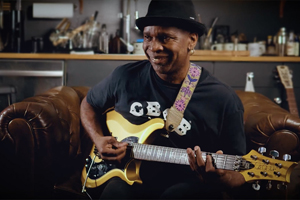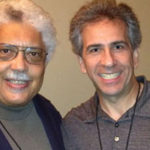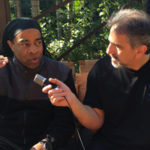Living Colour guitarist talks about more than three decades in the spotlight
By Gary Graff
January 10, 2018
In 2018 we can view Vernon Reid as one of the world’s elite guitar players, with a 30-year recording history as the founder of Living Colour and a rich resume that also includes the jazz fusion group Spectrum Road and collaborations with the late Jack Bruce, Mick Jagger, Public Enemy, Bill Frisell, James Blood Ulmer, Ronald Shannon Jackson, Geri Allen and more. But back in the ‘80s, the list of mainstream African American rock guitar heroes could be counted on one hand, and not even need all five fingers. Through Living Colour and the Black Rock Coalition, Reid hammered (and riffed) a place for black artists in the rock world, scoring platinum sales and winning Grammy Awards (four of ’em) as well as creating lyrically potent hits such as “Cult Of Personality,” “Glamour Boys” and “Open Letter To A Landlord.” Living Colour is still going strong, and Reid is as forceful a presence now as he was three decades and more ago…
FGPO: You’re heading towards 35 years of Living Colour, and it’ll be 30 years this year since the group’s first album. What kind of longview do you have about the band these days?
Reid: From my perspective, I started the band in a different time, and my perspective is that we did something highly unlikely. And aside from the most obvious fact that we’re African American, the thing I’m proudest of is that we did something that we had about as much of a chance as a snowball in a pizza oven, and we did what we did. We managed to do it, and we did it without compromising what we had to say. I don’t want to make concessions to people being afraid or misunderstanding or not saying the truth from our perspective, and that’s the thing that I’m really proudest about.
FGPO: At this juncture there’s a legacy component as well.
Reid: Y’know, if the band has at least influenced people to follow their dreams…It doesn’t matter who the people are, but the fact that we did this unlikely thing, if that allows some people to do something also unlikely, then I’m really happy. I talk to people who are grown, who are like: “Man, I started playing guitar because of ‘Cult Of Personality,’” and I think about it and those times I’ve been around Carlos Santana or the glorious time I spent with Jack Bruce…I think we’re part of a great history, and I’m really proud of our small part of it, because if it affects people’s lives in a positive way and lets them know they could do it, too, then that’s all I need. Really, that’s just about it.
FGPO: There’s the fact that the band broke through a number of existing barriers in music, too.
Reid: Well, sure. Many people became aware of us because of our MTV video for “Cult Of Personality,” and this happened on the heels of when MTV wasn’t programming black artists. It was David Bowie who stood up during a live interview and talked directly about that. Then Michael Jackson, “Billie Jean,” got programmed and it kind of was a crack and an opening for something as radical and different as “Cult Of Personality” to be programmed. All of these things we deal with are tied to history. And when I look at what’s happening today in the Black Lives Matter movement and so many other things, it’s really part of the same continuing story.
FGPO: So where all does your playing come from?
Reid: Y’know, I was influenced by great, great players, and not just the famous ones. The famous ones were, like, Carlos Santana, Jimi Hendrix, Robert Fripp, B.B. King. But there were local guys; I always mention Arthur Rhames — he was just this tremendous multi-instrumentalist, one of the greatest guitarist I’ve ever seen, and that includes anyone else who’s ever influenced me — Allan Holdsworth or what have you, people like John McLaughlin and Larry Coryell or the great rhythm players like Curtis Mayfield. And also other instrumentalists like Eric Dolphy and John Coltrane, who was such a big influence on Carlos Santana, and Miles Davis and all the great trumpet players.
FGPO: And the next step from there…
Reid: I have always felt that you have to develop your own voice. Like, listening to Jan Akkerman from Focus, he doesn’t sound like anyone else. So having my own [voice] and developing it and refining it, that’s been the thing. When I’ve been honored to lead workshops and trade licks with Joe Satriani or Steve Vai, the thing I tell people again and again is you have to find yourself. There’s so many wonderful techniques and so many wonderful things, and then you just find out who you are. I’m still finding out who I am, really. You can fall into trying to sound exactly like Hendrix. You can fall into trying to play like Steve Vai. But you’ve got to find your own thing, and that’s kind of been my trip for good and ill, being myself.
FGPO: We’ve seen you play some cool guitars over the years. Do you have a favorite or two?
Reid: My yellow guitar called Miss Voodoo is pretty great; it’s a Hamer custom. I just like the balance of it. It’s kind of weird to play; it’s got a painting all over the neck and doesn’t have position markers or anything. When I first got it, I didn’t play it a lot; it was like: “Oh, s***, I don’t know where I am on this thing.” It was really subconscious.
FGPO: You couldn’t just put the blindfold on and create brilliance just by feel back then?
Reid: [laughs] Y’know, when I’m playing guitar I can play without looking at it, if I’m just playing. If I start thinking about it and go into that spiral of thinking, it gets weird. Somewhere along the way, I crossed that line with that [Hamer] guitar, where I’m just able to feel it.
FGPO: You can really develop a relationship with a guitar that’s more than an instrument, can’t you?
Reid: Oh, dude…They’re like my old friends, like my family in a way. Some of them still have the EMG [pickups]; I’ve switched some of them from EMG to Tom Anderson pickups, that are really, really good. The Hamer company moved on in a lot of ways; they’re owned by Command Music and don’t really build that style of guitar anymore. There are other brands, like Brian Moore Guitars, I’ve played in a lot of different situations. They build them exactly to my specifications, and they’re pretty great.
FGPO: Living Colour broke up in 1995 but was back together again five years later, and has been going steady ever since. Did you think it was done for good at the time?
Reid: It was an interesting process, the band coming together again. Everybody’s got to go through their own things, certain things. Breakups, like divorces, are ugly. It’s really difficult to see breakups that are not fractious, and then coming back together again, it’s like you started dating your ex-wife. No matter how nice it is now, how much you love her or how great it is, you’re gonna bump up against the very things that broke you apart. You are who you are, and that’s OK. That’s a reality. Hopefully as time goes on you learn to deal with those things so they don’t break you apart again.
FGPO: So what do you know now? What’s the glue that binds the band together?
Reid: It’s kind of like everyone’s got to ask themselves fundamental questions about “What is music for me?” Everyone is more willing to be real about real things. It’s very interesting; on one hand, I’m very clear in my own head you cannot fix the past. Every band has its own little militia, every militia has its own history, its own heroes and villains. Everyone lives their own mythology against a background of what race you are or what country you live in. We all have stories. We can countlessly recall gigs that were fabulous, gigs that were whack. But we’re in the here and now, and it’s an interesting place to be.
FGPO: So what kind of relationship do you have with songs that are going on 30 years old now?
Reid: It’s all our music on a level, but it’s just very funny the things that go on in the mind. I play “Cult Of Personality,” I love that song. We’ve played it every show. It’s like every time I’ve seen Santana, he plays “Black Magic Woman.” Wherever he is, he’s gonna play that song. It’s a strange thing; those songs have a life of their own in the heads of everybody. It’s trippy to have something get to that point.
FGPO: Living Colour’s latest album [2017’s Shade] is blues-influenced but not a pure kind of blues album. What was the creative intention?
Reid: It’s really rethinking the blues and its relationship to metal. Because of our gadgets and in spite of our gadgets, the blues will always be with us, kind of like The Force in Star Wars — may the blues be with you! [laughs] There’s a kind of narrative about how rock came to be, and certainly part of how it came to be was the British Invasion bands that kind of restarted the careers of a bunch of blues artists. Many of them were from working class backgrounds; what the Beatles did, coming from Liverpool, was socially revolutionary as well as musically. So with [Shade] we were connecting to do that, but doing it not in kind of a retro way. We play loud. There’s some energy there. It’s a really special moment.






